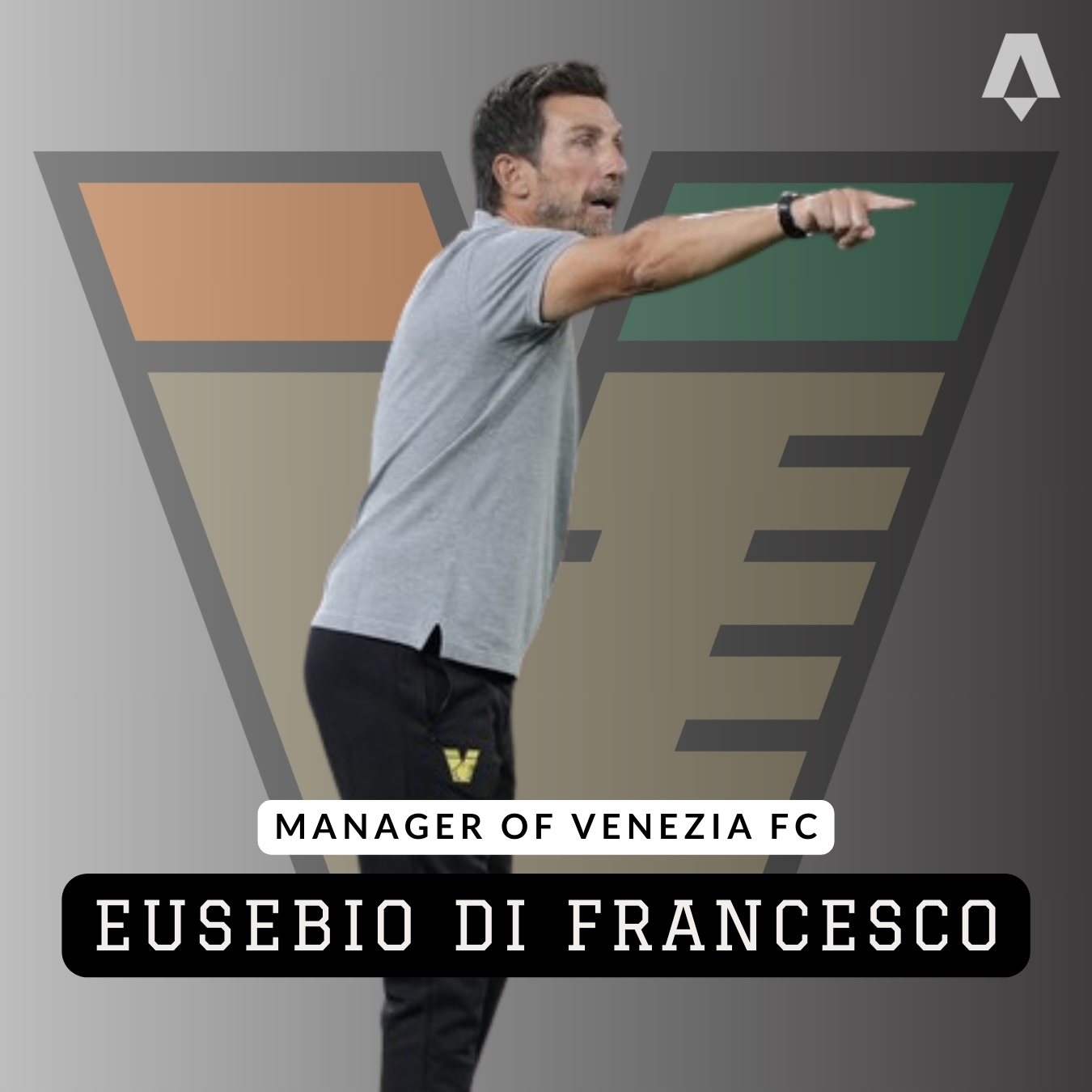Born: 8 September 1969
Nationality: Italian
Place of birth: Pescara, Italy
Debut season as manager: 2008/2009
Current Club: Venezia FC
Contract: 26 June 2024 – 30 June 2026
Titles as manager:
- None
Other Achievements as manager:
- Promoted US Sassuolo from Serie B to Serie A 2012/2013
- Secured Sassuolo’s first-ever qualification for the UEFA Europa League in 2016, after finishing 6th in Serie A.
- Achieved a 3rd place finish in Serie A during his first season with AS Roma in 2017–18
- UEFA Champions League semi-finalist with AS Roma in 2017–18
Managerial career:
Di Francesco’s managerial career has been a mix of highs and lows. He has been praised for his progressive footballing style but has also faced criticism for inconsistency at certain clubs.
His time at US Sassuolo (2012–2014, 2014–2017) was the most successful one where he initially took over in 2012. Under his leadership, Sassuolo gained promotion to Serie A in 2013 for the first time in the club’s history, marking a major achievement. After a brief exit in 2014, he returned to lead the team to further success in Italy’s top flight with a high finish which was the Nerroverdi qualify for european football. This was a historic moment for the club and a testament to his ability to maximize the potential of smaller clubs.
After the success in Sassuolo Di Francesco was rewarded with the big task to manage AS Roma (2017–2019): He took charge of AS Roma in 2017, where he had previously been a player. His most significant achievement came in the 2017–18 UEFA Champions League, when Roma made an astonishing run to the semi-finals, including a famous comeback against Barcelona in the quarter-finals, overturning a 4-1 first-leg deficit with a 3-0 win at home.
Despite this European success, his tenure at Roma saw mixed results in Serie A, and he was eventually dismissed in March 2019 after a string of poor performances.
After Roma, Di Francesco managed several other clubs, but with less success:
- Sampdoria (2019): His spell here was short-lived, and he was sacked after only seven games due to poor results.
- Cagliari (2020–2021): Another challenging tenure where results did not go his way. Cagliari struggled near the relegation zone, leading to his dismissal in February 2021.
- Hellas Verona (2021): His stint at Hellas Verona was also brief, as he was dismissed after only three games into the 2021–22 season following three consecutive losses.
System of Play:
Di Francesco is best known for his 4-3-3 formation, which reflects his commitment to attacking football. His tactical approach emphasizes high pressing, vertical passing, and quick transitions. Here are some key aspects of his tactical philosophy:
- Attacking Football: Di Francesco’s teams focus on proactive football, with an emphasis on possession and building from the back. His 4-3-3 formation is geared towards creating width and stretching opposition defenses, with the full-backs and wingers playing a pivotal role in attacking transitions.
- Pressing Game: One of the hallmarks of Di Francesco’s system is an aggressive high press. His teams aim to win the ball high up the pitch and launch quick attacks, capitalizing on turnovers. This was particularly effective during his time at Sassuolo, where he coached a squad that was well-organized and committed to pressing as a unit.
- Vertical Play: Di Francesco encourages direct, vertical passes to quickly advance the ball from defense to attack. His philosophy is to move the ball quickly through midfield and exploit spaces behind the opposition’s defense, especially using the speed of wingers and full-backs to create overloads on the flanks.
- Role of the Wingers: The wide players in his 4-3-3 system are crucial. Wingers are expected to stretch the play, cut inside, and link up with the central striker, creating chances through both crosses and dribbles. At Roma, players like Mohamed Salah (before his move to Liverpool) and Stephan El Shaarawy were vital in executing this system.
- Fluid Midfield: His 4-3-3 system features a midfield trio where the central midfielder often acts as a deep-lying playmaker (or regista), while the other two midfielders are responsible for covering space and contributing to both attack and defense. Di Francesco expects his midfield to press high, win the ball back quickly, and then transition rapidly into attack.
- Defensive Fragility: One of the recurring challenges in Di Francesco’s career has been defensive solidity. His aggressive, attacking style can sometimes leave his teams vulnerable to counter-attacks, especially if the press is bypassed or if his defense is stretched by pacey opposition. This has been a key issue in his more challenging tenures.
Tactical Flexibility:
While the 4-3-3 is his preferred formation, Di Francesco has occasionally adapted his tactics based on the players at his disposal or the opponent. For instance, during his time at Roma, he occasionally used a 3-4-3 or 4-2-3-1 to adjust the team’s defensive structure or to accommodate certain attacking players.
Leadership and Man-Management:
Di Francesco is known as a passionate and hands-on coach, someone who thrives on building relationships with his players. He encourages an attacking mindset and a collective team spirit. However, his success often depends on the right blend of players, as he has sometimes struggled to adapt when managing teams with lesser quality or different profiles.
Summary:
Eusebio Di Francesco is a manager with a clear attacking philosophy, centered around high pressing, possession-based football, and vertical play. His greatest success came at Sassuolo, where he built a competitive team and achieved unprecedented results, and at Roma, with the famous Champions League run. However, his tenures at other clubs have been less successful, particularly when his tactical ideas didn’t yield the desired results or when his teams struggled defensively. Nonetheless, Di Francesco remains a respected figure in Italian football for his commitment to exciting, forward-thinking football.


